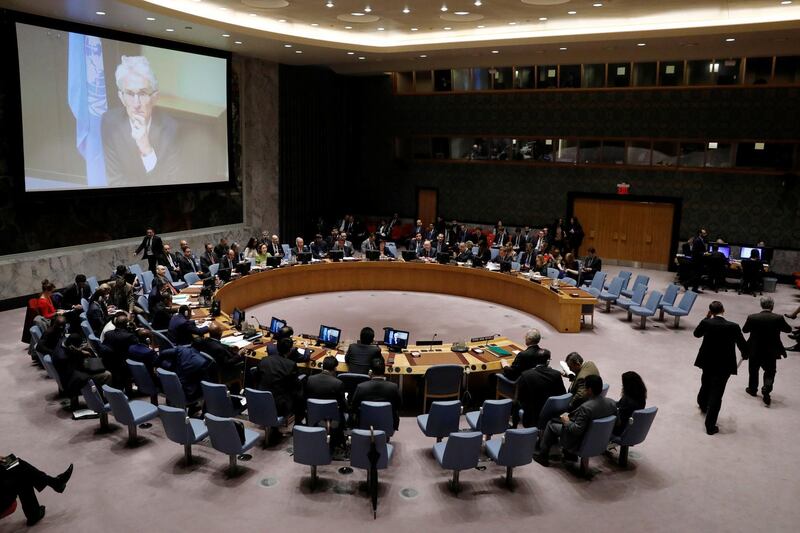Western diplomats at the United Nations expressed anger and frustration on Thursday evening after Russia torpedoed efforts to reach a ceasefire deal for Syria, dimming prospects of international action to halt the death in Eastern Ghouta.
A vote on a draft security council resolution was postponed for at least a day after the Russian ambassador tabled a set of amendments and railed against what he said was a “co-ordinated psychosis spread by global media outlets” about the region.
He spoke after the security council heard a string of appeals for urgent help. Mark Lowcock, the UN’s humanitarian aid chief, said almost 300 people had died during the past three days of shelling and airstrikes.
A Western diplomat said Russia was responsible for sabotaging a much needed humanitarian pause in the fighting.
“There’s a widespread sense of outrage among the majority of council members that Russia would seek to block a humanitarian resolution aimed at securing a 30-day ceasefire,” he said.
It means once again Russia has threatened the use of its veto to delay a humanitarian effort as it tries to shield Syrian forces attacking rebels.
Western diplomats hope a vote is possible on Friday but privately say the Russian amendments are unacceptable to the US and European members of the council.
They include stipulations that aid deliveries can be made only when security conditions allow and that foreign military forces can act only in co-ordination with Damascus.
The resolution had been two weeks in the making and was designed to allow deliveries of aid and medical evacuations.
It was discussed even as the Syrian army dropped leaflets on the area – a suburb of the capital Damascus – warning residents to leave.
Vassily Nebenzia, Russia’s permanent representative to the UN, said a vote was being pursued even though Sweden and Kuwait, its sponsors, were “fully aware there is no agreement on it”.
_______________
Read more:
[ Syria's Ghouta: Are seven years of rebellion about to end? ]
[ UAE calls for immediate truce in Eastern Ghouta ]
[ Afrin explained: a multi-sided conflict where enemies are allies and allies are enemies ]
_______________
He added that it was unrealistic to think the resolution could impose a ceasefire and said the council would be taking a decision that would be “severed from reality”.
Instead he accused other council members of trying to create “a scandal in order to step up pressure on the Syrian government and taint the Russian government”.
His words fly in the face of growing evidence that a humanitarian catastrophe is unfolding amid a growing international outcry over the assault on Eastern Ghouta.
German Chancellor Angela Merkel called on the European Union to step up pressure on Russia and Iran to end the violence.
“The regime is not fighting against terrorists, but against its own people, killing children, destroying hospitals, and this is a massacre to be condemned,” she told Parliament.
Boris Johnson, the UK’s foreign secretary, demanded urgent UN action to help the people of Eastern Ghouta.
“They are enduring a hell entirely of the making of Asad and his enablers,” he said.
The security council also heard an impassioned plea for action by Mr Lowcock, who said aid workers had been able to reach only two percent of the besieged population for the past three months.
“What we need is a sustained cessation of hostilities and we need it desperately,” he said. “Millions of battered and beleaguered children, women and men depend on meaningful action by this Council.”
He described a litany of human suffering, amid 23 attacks reported on vital human infrastructure, including hospitals and clinics, in the past three days.
“The only primary health care centre in Modira town was reportedly rendered out of service by airstrikes,” he added. “A hospital in Duma city sustained significant damage from nearby barrel bombs.”
The result was, he said, an entirely predictable and preventable humanitarian disaster.
The impasse heaps further pressure on the UN, highlighting its inability to find a solution.
Speaking before the vote was shelved, Francois Delattre, the French ambassador, said failure to act to help Eastern Ghouta could sound “the death knell of the United Nations”.
Stephen Hickey, the UK’s acting deputy permanent representative to the UN, said the security council had failed to uphold its responsibilities to the people of Syria.
“This is hell on earth. The scale of the human suffering and destruction is unbearable,” he said.
“The suffering of the Syrian people, while primarily the responsibility of the Syrian regime, brings shame on all of us in this council.”
Outside UN headquarters in New York, a coalition of aid groups put up three billboards, inspired by the film “Three Billboards outside Ebbing, Missouri” that said “500,000 dead in Syria. And still no action? How come Security Council?”





